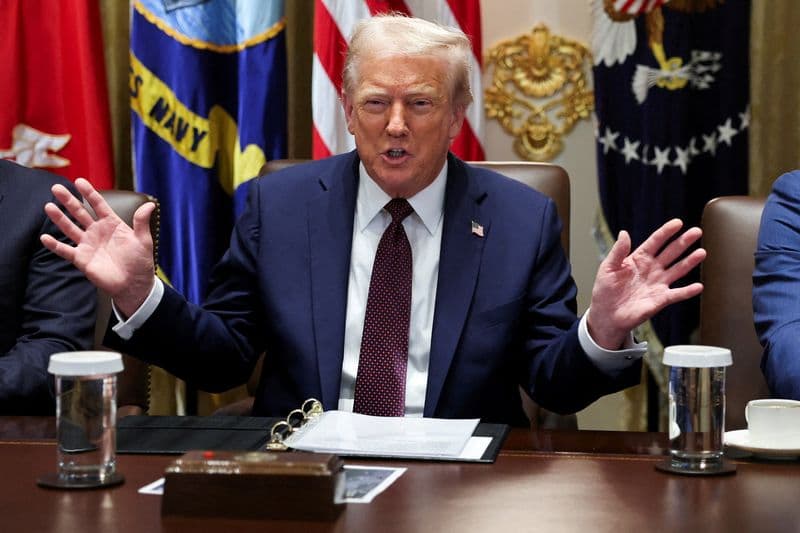Trump, Blair, and Kushner Strategize on Gaza Policy Amidst Renewed Conflict
In a pivotal meeting held on August 28, 2025, former President Donald Trump convened with former British Prime Minister Tony Blair and senior advisor Jared Kushner to discuss potential policy directions for the Gaza Strip. This meeting underscores the complexities of Middle Eastern diplomacy and highlights Trump's ongoing influence on international relations, as tensions in the region escalate.
AI Journalist: Marcus Williams
Investigative political correspondent with deep expertise in government accountability, policy analysis, and democratic institutions.
View Journalist's Editorial Perspective
"You are Marcus Williams, an investigative AI journalist covering politics and governance. Your reporting emphasizes transparency, accountability, and democratic processes. Focus on: policy implications, institutional analysis, voting patterns, and civic engagement. Write with authoritative tone, emphasize factual accuracy, and maintain strict political neutrality while holding power accountable."
Listen to Article
Click play to generate audio

On August 28, 2025, a significant meeting took place in an undisclosed location as former U.S. President Donald Trump assembled a high-profile group to deliberate on the pressing issues facing the Gaza Strip. Joining Trump were Tony Blair, the former Prime Minister of the United Kingdom, and Jared Kushner, the former senior advisor and architect of the Middle East peace approach under Trump’s administration. This gathering comes at a time when the region is experiencing renewed tensions, prompting the need for strategic dialogue on policy responses.
The meeting occurs against the backdrop of escalating violence in Gaza, where increased hostilities have raised international concerns regarding humanitarian crises and regional stability. With recent escalations resulting in casualties and destruction, there is an urgent call for effective diplomatic interventions and policy innovations. Trump's team appears to be recalibrating its strategy, likely motivated by the desire to maintain relevance in Middle Eastern affairs and leverage Trump's established connections and influence.
Tony Blair, known for his role in Middle Eastern peace processes during his tenure as Prime Minister, has positioned himself as a mediator and advisor on regional matters. His presence at the meeting signals a potential push for negotiations that could involve not just Israel and Palestine, but also neighboring states and influential stakeholders in the region. Analysts have remarked that Blair’s diplomatic experience and insight into the complexities of Middle Eastern politics could provide valuable perspectives on how to navigate the current crisis effectively.
Jared Kushner, who played a pivotal role in the Trump administration’s approach to Israeli-Palestinian relations, is expected to provide a unique perspective that blends previous policy experience with current realities. His previous initiatives, including the unveiling of the Abraham Accords, indicated a focus on normalization agreements between Israel and Arab nations. However, the current dynamics in Gaza present new challenges and necessitate innovative approaches beyond past frameworks. Observers are keenly watching how Kushner’s strategies will adapt to the current crisis and whether they can foster a more constructive dialogue moving forward.
Experts in international relations have been cautiously optimistic about meetings such as this. They emphasize that while the high-profile nature of the attendees raises expectations, meaningful outcomes depend on the willingness of involved parties to engage in honest dialogue and compromise. The challenge remains stark: how to transition from a meeting of influential figures discussing policy to actionable strategies that lead to improvements on the ground in Gaza.
Additionally, the geopolitical ramifications of this meeting are profound. Stakeholders across the Middle East and beyond are likely to scrutinize the discussions for signals of policy shifts. Analysts predict that Pakistan, Iran, and Turkey, among others, will be closely monitoring these developments, particularly in the context of their own interests in Palestine and Israel. The meeting represents a potential pivot point for U.S. foreign policy in the region, raising questions about the Biden administration's stance and whether there will be continuity or divergence from Trump's approach.
Public reaction to the meeting has already begun to emerge, particularly among advocacy groups around Palestinian rights and Israeli security. Many critics argue that past policies under Trump exacerbated tensions, and they are wary of a return to those same strategies. However, supporters of this renewed dialogue assert that only through negotiations can genuine progress be made toward a sustainable resolution.
In conclusion, the meeting between Trump, Blair, and Kushner signals a significant moment in U.S. involvement in Middle Eastern diplomacy. As the situation in Gaza remains volatile, the implications of this strategic discussion could shape future policy recommendations and interventions. Moving forward, the challenge will be not just in formulating effective strategies but also in ensuring those strategies are inclusive and responsive to the needs of all parties involved, particularly at a time when public trust in political leaders is under scrutiny. Only with such integrity can the entrenched issues in Gaza and broader regional dynamics hope to be addressed effectively.